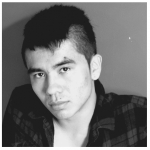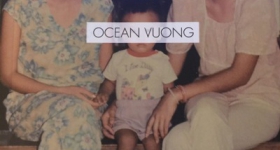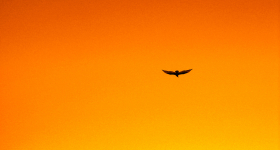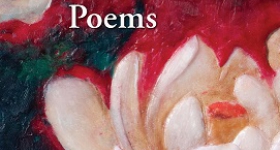Despite Everything, My Dancers
By Ocean Vuong
He takes her hand and they step
into bomb crater. Look how they shuffle
and sway in its moon-bruised shade.
All around them the crickets.
Saigon shimmering beyond the road
swept blue with dust. Their faces beaming
the way youth beams in its thrill
of falling. As if through the hips' twisted
caesuras, the body's history can
be exorcised, can, like umbilical cords,
be buried in a field where the dead
resurrect in spring's greenest shoots.
And how can she know, her forehead kissed
with jeweled sweat, that she will never
be this lovely again? That in one week
he will learn the quickest way
to quiet a woman — is to make her forget
how beauty fits her: his faux-Rolex bursting
against her cheek, a shatter of stars
he picks away with promises.
But for now — the field hums a strange
sweetness, and they're dancing, stumbling
hand-in-hand as lovers do
when love has yet to make distance
a pleasure. Let them navigate the smoother rhythm
into morning, through a country lashed
with scraps of wars, the lost shards of homes.
Ask me of the song and I will tell
of the rain's slow murmur.
Ask me of the dancers, and I will tell
of the fools who kept dancing, even
as the earth cracked beneath their feet.
The fools I will crawl to at the end
of every broken year, my palms open, begging
for the many ways to lift this body,
this dead weight — into music.
**
Reconstructing History with Emerging Poet Ocean Vuong
by Karissa Chen
Talk about where this poem came from.
I grew up surrounded by stories of my parents’ lives in Vietnam, stories often punctured with holes that only widened as the family slowly fractured after immigrating to the US. I guess what I’m attempting in my poems is to weave together and make sense of these pieces. This poem's genesis is from a story of my how my parents met, how they came home from a dance club in Saigon. While heading back, my father, the romantic that he is, stopped and convinced my mother to dance with him in a rice field. Growing up, I was perpetually haunted by this image of my violent father, a former member of the Chinese mafia, dancing in a dark field with his first and only love, surrounded by cricket song. In a way, I think all of my poems begin and end in that field.
I love how voyeuristic the poem is, as if we're being led by the narrator to watch an intimate scene unfold. But I particularly liked how it shifts at the end and swivels to focus on the narrator.
I think it's a way of returning to history, one that can be experienced only through stories that have been handed down. Because stories tend to possess a distant and abstract identity, especially stories of our parents, they can become embedded in the mind as mythos — their characters suddenly larger than life. The narrator can no longer be simply telling a story; he must, through his participation in the fabrication of history, be a part of it. I see the writer's relationship with history to assume a spirallike shape, one in which she returns to certain events but only at a further distance, a different vantage point. In this way, things once hidden could be revealed, or at least be better understood because the hidden moves beyond the fraudulent idea of history conforming to a controlled and linear chain of events.
You depict violence here with as much tenderness as you depict dance and music. Can you speak about this juxtaposition?
This might be my Buddhist practice creeping in: the attempt to use poetry as a way of questioning certain preconceived ideals of beauty. By juxtaposing a graceful dance with the carnage of war, we begin to see language blurring those lines, the grey area expanding as the poem collapses and revives, this time with different definitions of beautiful. The purpose, I hope, is not simply to say, “Look, ugly things aren't so ugly after all,” but rather that sometimes we might see something new or profound if we weren’t so eager to look away from destruction; that we might be able to learn something from it, even if it's something as insubstantial as beauty.
At 23, you're considered one of the younger emerging Asian American poets right now. Where do you see Asian American poetry heading, and how do you hope to establish yourself in that space?
Asian American poetry is heading toward very exciting and invigorating fields. As more Asian Americans begin to embrace the possibility of being writers and artists, the future of poetry in the Asian American diaspora is rich. A lot of our parents are beginning to understand that success does not necessarily mean being a doctor or a lawyer, but that sometimes it is equally, if not more valuable, to be able to tell and shape the stories of our unique past that would otherwise become extinct.
For example, because of the war in Vietnam, my entire adult family is illiterate. I am the first to read and attend university. Whenever I am reading a book, my family will slowly dissipate from the room. They are afraid of disturbing me. They see reading and writing as something holy and mystifying. And in many ways, they are right. What could be more magical than a child forging his parents’ lives, their beauty and tragedies into art? They gave me the blessing of their lives, these dancers stumbling in the rice field, trying to find their footing in the beginning of their lives — if I won't tell it, those dancers would be lost forever. And that, to me, is not an option.
Do you have any influences? What are you reading right now?
I am more influenced by poems than by poets. But some of the poets I turn to again and again include Asian Americans like Mari L'Esperance, Oliver de la Paz, Joseph O. Legaspi, Patrick Rosal, Linh Dinh, Tina Chang, Matthew Olzmann, Kimiko Hahn, Li-Young Lee and Bao Phi.










Comments